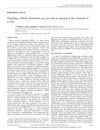 11 citations,
July 2017 in “Expert Opinion on Investigational Drugs”
11 citations,
July 2017 in “Expert Opinion on Investigational Drugs” New hair loss treatments may include topical medications, injections, and improved transplant methods.
 11 citations,
August 2015 in “PLOS ONE”
11 citations,
August 2015 in “PLOS ONE” Finasteride affects brain stress and enzyme activity differently in various regions, possibly helping with liver-related brain issues.
 11 citations,
August 2000 in “Journal of Endocrinology”
11 citations,
August 2000 in “Journal of Endocrinology” DHEA acts like a male hormone on rat skin glands and doesn't turn into female hormones there.
 10 citations,
May 2020 in “Dermatology Research and Practice”
10 citations,
May 2020 in “Dermatology Research and Practice” Proteoglycans are important for hair growth, and a specific treatment can help reduce hair loss.
 10 citations,
January 2004 in “KARGER eBooks”
10 citations,
January 2004 in “KARGER eBooks” Diagnosing PCOS in teenage girls is tricky and requires careful evaluation and management.
 9 citations,
March 2001 in “Clinics in dermatology”
9 citations,
March 2001 in “Clinics in dermatology” Hirsutism in women is often due to hormone sensitivity and has significant psychological effects.
 7 citations,
January 1992 in “Adolescent and pediatric gynecology”
7 citations,
January 1992 in “Adolescent and pediatric gynecology” Early diagnosis and treatment of PCOS in teenagers can help prevent more severe adult PCOS.
 6 citations,
April 2019 in “Endocrinology and Metabolism Clinics of North America”
6 citations,
April 2019 in “Endocrinology and Metabolism Clinics of North America” Testosterone therapy for transmasculine individuals is generally safe with medical supervision, improves mental health, and has mixed effects on physical health.
 6 citations,
January 2010 in “Springer eBooks”
6 citations,
January 2010 in “Springer eBooks” SA linked to mitochondrial issues and oxidative stress, while AGA involves disrupted hair growth genes.
 4 citations,
January 2018 in “Forensic Science International”
4 citations,
January 2018 in “Forensic Science International” Researchers created a reliable method to detect hair-growth substances in products.
 3 citations,
July 2011 in “Expert Review of Dermatology”
3 citations,
July 2011 in “Expert Review of Dermatology” Effective treatments for excessive hair growth in women include creams, laser therapy, and medications, with the choice depending on individual needs and potential side effects.
 3 citations,
February 2008 in “Basic and clinical dermatology”
3 citations,
February 2008 in “Basic and clinical dermatology” Telogen Effluvium is a hair loss condition where treatment involves identifying and managing its triggers.
 3 citations,
October 1982 in “Postgraduate Medicine”
3 citations,
October 1982 in “Postgraduate Medicine” Most types of hair loss can regrow naturally, but there are no effective cures for male pattern or age-related hair loss, and only limited options for females.
 2 citations,
March 2019 in “American journal of physiology. Renal physiology./American journal of physiology. Renal physiology”
2 citations,
March 2019 in “American journal of physiology. Renal physiology./American journal of physiology. Renal physiology” New treatments targeting fibrosis could improve urinary symptoms in BPH.
 1 citations,
January 2017 in “Elsevier eBooks”
1 citations,
January 2017 in “Elsevier eBooks” The document concludes that new treatments for hair loss may involve a combination of cosmetics, clinical methods, and genetic approaches.
 December 2023 in “Frontiers in endocrinology”
December 2023 in “Frontiers in endocrinology” Excess androgens may cause PCOS, not just be a symptom.
 October 2023 in “Frontiers in endocrinology”
October 2023 in “Frontiers in endocrinology” Effective PCOS treatments require targeting specific signaling pathways.
 September 2023 in “Research Square (Research Square)”
September 2023 in “Research Square (Research Square)” Evening primrose oil significantly improves hormone levels and reduces BMI and cholesterol in women with PCOS.
 January 2023 in “Postępy Dermatologii i Alergologii”
January 2023 in “Postępy Dermatologii i Alergologii” Azelaic acid treats acne, rosacea, and hyperpigmentation with minimal side effects.
 July 2022 in “International journal of medical science and clinical invention”
July 2022 in “International journal of medical science and clinical invention” Women with irregular periods should be checked for PCOS and treated early to prevent complications, with birth control pills helping to manage symptoms.
 October 2018 in “InTech eBooks”
October 2018 in “InTech eBooks” The most effective treatments for hair loss are minoxidil, finasteride, PRP, and hair transplants, with steroids and immunosuppressants for autoimmune types.

Early NAS level changes affect alcohol consumption vulnerability.
 April 2016 in “Annals of laboratory medicine”
April 2016 in “Annals of laboratory medicine” The method reliably profiles eicosanoids and shows epitestosterone reduces their levels, similar to common anti-inflammatory drugs.

Modern hair restoration techniques can effectively treat hair loss and provide natural-looking results.
 May 2006 in “Women's Health Medicine”
May 2006 in “Women's Health Medicine” Excessive hair growth in women, often from high androgen levels, is usually caused by PCOS, and can be treated with hair removal, medication, and possibly weight loss.
 January 2009 in “Egyptian Journal of Medical Human Genetics”
January 2009 in “Egyptian Journal of Medical Human Genetics” The study suggests that a specific gene variation and higher gene activity are linked to increased baldness in Egyptian men.
 378 citations,
November 2011 in “Human reproduction update”
378 citations,
November 2011 in “Human reproduction update” Experts recommend using evidence-based methods to diagnose and treat hirsutism, focusing on symptoms and underlying causes.
 282 citations,
October 2006 in “The Journal of Clinical Endocrinology and Metabolism”
282 citations,
October 2006 in “The Journal of Clinical Endocrinology and Metabolism” The Endocrine Society advised against routine testosterone therapy for women, citing a need for more research on long-term safety and a clear definition of androgen deficiency.
 209 citations,
September 2008 in “Dermatologic Therapy”
209 citations,
September 2008 in “Dermatologic Therapy” Androgens can both increase and decrease hair growth in different parts of the body.
 204 citations,
February 2000 in “Current Medicinal Chemistry”
204 citations,
February 2000 in “Current Medicinal Chemistry” Antiandrogens like flutamide are effective in treating conditions like prostate cancer and hair loss, but there's a need for more potent versions. Understanding their structure can help develop better treatments.






























